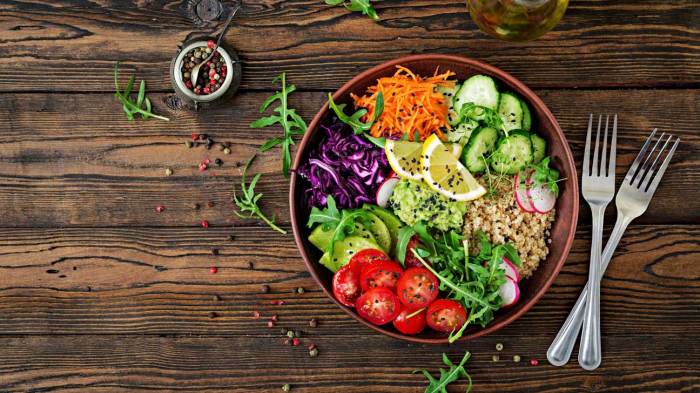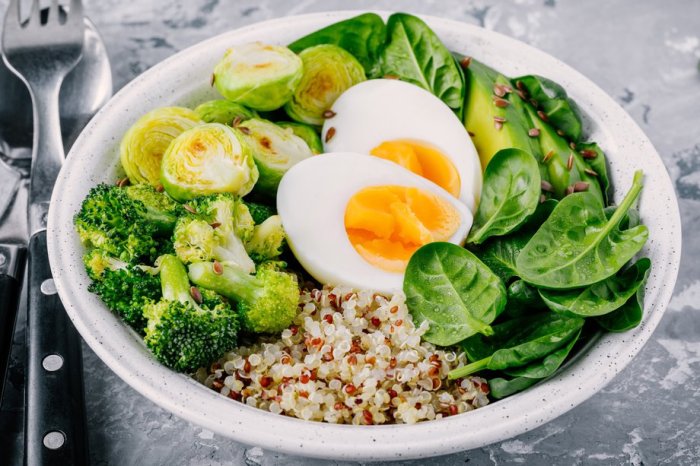How to eat healthy as a vegetarian – Embarking on a vegetarian lifestyle presents unique nutritional considerations, but with the right knowledge, it’s entirely possible to thrive on a plant-based diet. This comprehensive guide will equip you with the essential strategies and insights to ensure a healthy and fulfilling vegetarian journey.
From exploring diverse protein sources to navigating essential nutrient intake, we’ll delve into the intricacies of vegetarian nutrition, empowering you to make informed choices that support your well-being.
Plant-Based Protein Sources

A balanced vegetarian diet includes a variety of plant-based protein sources to ensure adequate intake of essential amino acids. These sources provide the building blocks for muscle growth, repair, and overall health.
Legumes
- Lentils:Rich in protein, fiber, and iron. Ideal for soups, salads, and curries.
- Beans (Kidney, Black, Pinto):Excellent sources of protein, fiber, and antioxidants. Versatile for chili, tacos, and salads.
- Chickpeas:High in protein, fiber, and folate. Used in hummus, falafel, and salads.
Tofu and Tempeh
Made from soybeans, these products are complete proteins, meaning they contain all essential amino acids. They are versatile and can be used in stir-fries, soups, and sandwiches.
Quinoa, How to eat healthy as a vegetarian
A complete protein grain that is also a good source of fiber and iron. It can be cooked like rice or used in salads and breakfast bowls.
Nuts and Seeds
- Almonds:Rich in protein, fiber, and healthy fats. Ideal for snacks, salads, and desserts.
- Chia Seeds:Excellent source of protein, fiber, and omega-3 fatty acids. Can be added to smoothies, salads, and baked goods.
- Pumpkin Seeds:High in protein, zinc, and magnesium. Can be roasted for snacks or added to salads and soups.
Plant-Based Substitutes: How To Eat Healthy As A Vegetarian

Plant-based substitutes are products made from plants that mimic the taste, texture, and nutritional value of animal products. These substitutes have become increasingly popular as more people adopt vegetarian and vegan diets.
Adopting a vegetarian diet can bring numerous health benefits, but it may also lead to certain nutrient deficiencies. To ensure you’re getting the essential nutrients, consider incorporating vegetarian diet supplements into your routine. These supplements can provide vitamins, minerals, and other nutrients that may be lacking in a plant-based diet.
There are many different types of plant-based substitutes available, including meat, dairy, and egg substitutes. These substitutes can be found in most grocery stores and online retailers.
Nutritional Content
Plant-based substitutes can vary in nutritional content compared to animal products. Some substitutes may be higher in fiber, vitamins, and minerals, while others may be lower in protein or certain nutrients.
It is important to read the nutrition labels carefully when choosing plant-based substitutes to ensure that you are getting the nutrients you need.
Taste and Texture
The taste and texture of plant-based substitutes can also vary. Some substitutes may taste very similar to animal products, while others may have a different flavor or texture.
It is important to experiment with different plant-based substitutes to find ones that you enjoy the taste and texture of.
Benefits of Using Plant-Based Substitutes
- Can help reduce your risk of heart disease, stroke, type 2 diabetes, and certain types of cancer.
- Can help you lose weight or maintain a healthy weight.
- Can be more environmentally sustainable than animal products.
- Can be more ethical than animal products.
Drawbacks of Using Plant-Based Substitutes
- Can be more expensive than animal products.
- May not taste or texture exactly like animal products.
- May not be as widely available as animal products.
Comparison of Plant-Based Substitutes to Animal Products
| Product | Plant-Based Substitute | Nutritional Content | Taste | Texture |
|---|---|---|---|---|
| Meat | Tofu, tempeh, seitan, lentils, beans | Lower in protein, higher in fiber | Similar to meat, but may be more bland | Firm and chewy |
| Dairy | Soy milk, almond milk, oat milk, coconut milk | Lower in protein and calcium, higher in fiber | Similar to dairy, but may be thinner | Creamy and smooth |
| Eggs | Flax eggs, chia eggs, tofu eggs | Lower in protein, higher in fiber | Similar to eggs, but may be more dense | Fluffy and moist |
Hydration and Overall Health
Staying hydrated is crucial for vegetarians, as their diet may lack the fluids provided by meat consumption. Adequate hydration supports numerous bodily functions, including nutrient absorption, waste elimination, and body temperature regulation.
Embracing a vegetarian lifestyle offers numerous health benefits, but it’s essential to ensure adequate nutrient intake. Vegetarian diet supplements can help bridge the nutritional gaps, providing essential vitamins, minerals, and other nutrients that may be lacking in a plant-based diet.
By supplementing with carefully chosen products, vegetarians can maintain a healthy and balanced nutritional profile.
Tips for Increasing Water Intake
* Set a daily water intake goal and track progress using a water bottle or app.
- Carry a reusable water bottle throughout the day and refill it frequently.
- Flavor water with fruits, vegetables, or herbs to make it more appealing.
- Consume water-rich fruits and vegetables, such as watermelon, cucumbers, and spinach.
Role of Exercise and Sleep in Maintaining Overall Health
Exercise promotes hydration by increasing sweat production, which signals the body to replenish fluids. Aim for at least 150 minutes of moderate-intensity exercise or 75 minutes of vigorous-intensity exercise per week.Sufficient sleep is essential for overall well-being. During sleep, the body repairs and restores itself, including replenishing fluids lost throughout the day.
Aim for 7-9 hours of quality sleep each night.
Final Review

Maintaining a healthy vegetarian diet requires a holistic approach that encompasses mindful meal planning, nutrient-rich cooking techniques, and a commitment to overall well-being. By embracing the principles Artikeld in this guide, you can unlock the transformative power of plant-based nutrition and experience the vibrant health that comes with it.
Essential Questionnaire
Is it difficult to get enough protein on a vegetarian diet?
No, there are many excellent plant-based sources of protein, including beans, lentils, tofu, tempeh, and quinoa.
What are some good sources of vitamin B12 for vegetarians?
Vitamin B12 is primarily found in animal products, so vegetarians should consider fortified foods or supplements to ensure adequate intake.
How can I make sure I’m getting enough iron on a vegetarian diet?
Good sources of iron for vegetarians include leafy green vegetables, beans, lentils, and fortified cereals.